Our Team
Friends Of Cross Charity .
Aisling Heeran
Research Area: Rectal Cancer
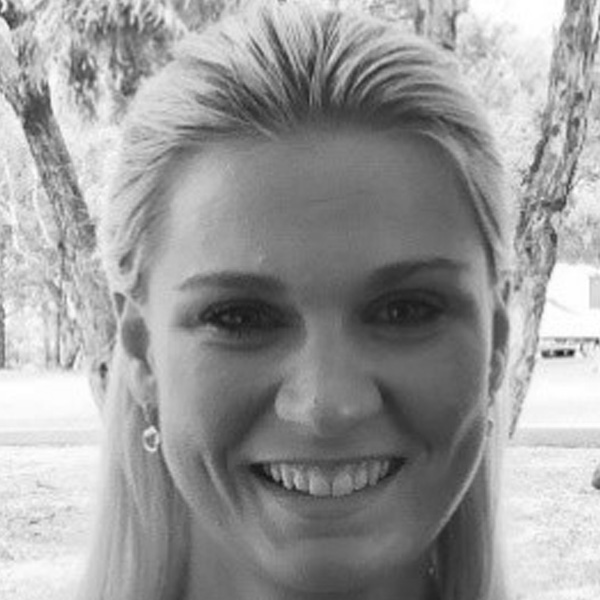
Amy Buckley
Research Area: Oesophageal Cancer
Amy completed her BSc in Pharmacology in University College Dublin in 2015. After completion of her undergraduate studies Amy was awarded an Irish Cancer Society Scholarship to carry out her PhD studies in the Department Of Surgery, Trinity College Dublin. Her research focuses on the identification of novel radio-sensitising compounds to improve response to radiation therapy in oesophageal adenocarcinoma (OAC). OAC is an aggressive disease with a very poor prognosis and a dismal cure rate of only 20%.
It is of great concern that the incidence of this cancer in Ireland and in the Western World has increased more rapidly than any other cancer, with a 48% rise in incidence rate over the past 15 years. Surgical treatment of OAC is associated with increased morbidly and mortality rates. Current therapeutic regimes focus on neo-adjuvant treatment (prior to surgery) with chemotherapy alone or chemoradiation (neoCRT) for locally advanced tumours. Unfortunately, only 20-30% of patients show a beneficial response to neo-adjuvant therapy with 70-80% of patients receiving a toxic treatment with no benefit. This major clinical challenge of treatment resistance reinforces the need for the discovery and validation of novel targeted therapies which will increase neo-adjuvant treatment response rates and act as radiosensitisers. An upregulation of angiogenesis, metabolism and DNA repair correlates with treatment resistance in OAC. We hypothesise that our novel family of drugs that inhibit angiogenesis, DNA repair and metabolism of tumour cells will improve treatment response..
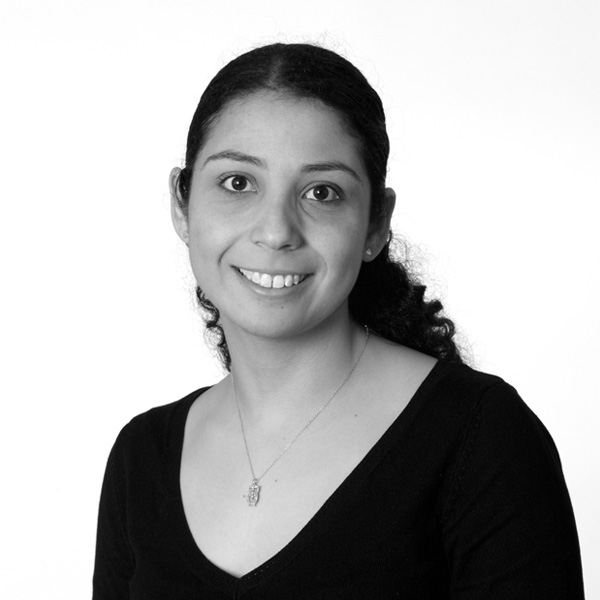
Ashanty Rodriguez
Research Area: NKT cells in Oesophageal and Gastric Cancer
Ms. Ashanty Maggvie Melo Rodriguez completed her undergraduate degree in Clinical Biochemistry at the Universidad de las Americas Puebla, Mexico in 2012. Her final year project was entitled “Evaluation of the immunoreactivity of Ki-67 as indicator in brain tumours” under the supervision of Dr. Luz del Carmen Quiroz. The aim of this project was to evaluate if Ki-67 can be used to indicate the growth fraction of brain tumours in paediatric patients using immunohistochemistry.
Following completion of her undergraduate degree, she then went on to complete an internship in the Department of Pathology at the University Medical Center Groningen in The Netherlands, under the supervision of Prof. Wilfred F.A. den Dunnen. Her roll here was to study the effect of CHIPs on astrocytomas samples via immunohistochemistry. Ms. Rodriguez then moved to Trinity College Dublin to undertake the M.Sc. in Immunology. Her 3 month project focused on the cytokine output of macrophages in the absence of UCP3. The aim of this project was to measure TNFα, IL-1β, IL-10 production by ELISA, and to determine the effect of UCP3 in the oxygen consumption rate and extracellular acidification rate. This project was done under the supervision of Prof. Richard Porter in the Trinity Biomedical Science Institute. During the master she took modules such as Genes and Immunity, Clinical Immunology, Tumour Immunology and Immunotherapeutic and product development. Ashanty was then granted funding from the Government of Mexico to carry out a Ph.D. in the Department of Immunology, School of Medicine in Trinity College Dublin, under the supervision of Dr. Derek Doherty and Dr. Joanne Lysaght. Her Ph.D. project focuses on the use of NKT cells as novel cellular based immunotherapies for oesophageal and gastric cancer patients. This project aims to carry out detailed functional and phenotypic analysis of human NKT cells and importantly to determine the effect of different chemotherapy drugs and radiotherapy on the NKT -cell viability and function.
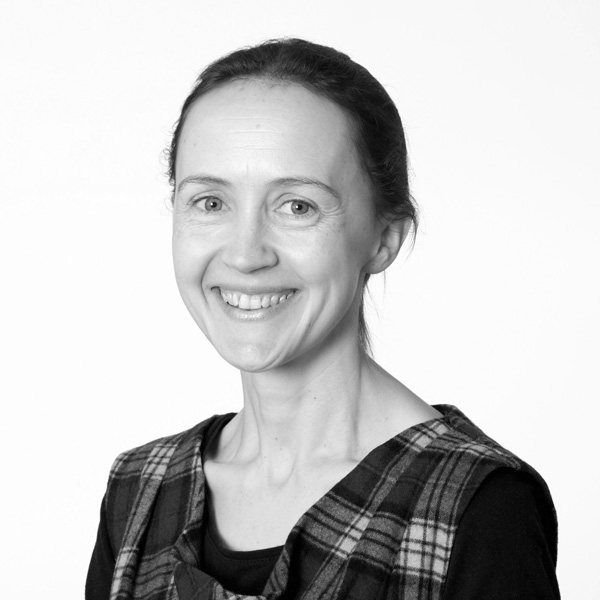
Dr Cliona Lorton
Research Area: C-Reactive Protein in cancer
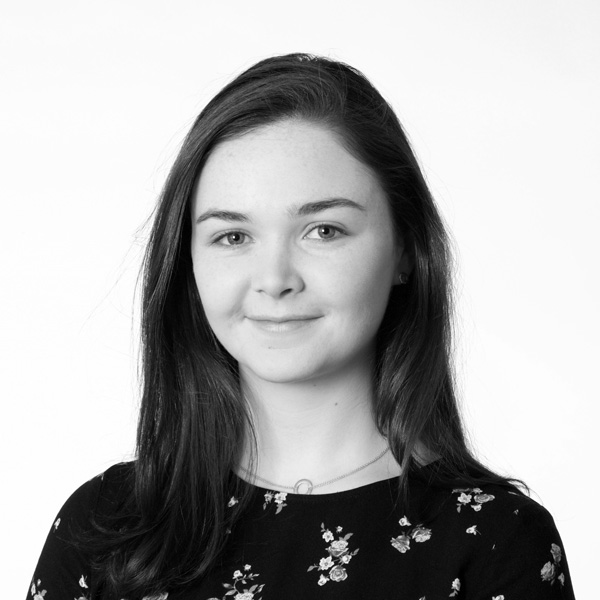
Croi Buckley
Research Area: Colorectal cancer
Rectal cancer (often described together with cancer of the colon as ‘colorectal cancer’ or ‘bowel cancer’) is a common cancer in Ireland and worldwide, with poor survival rates. Chemo-radiation therapy has been demonstrated to be very effective for some patients with rectal cancer to shrink tumours before surgery. However, a large proportion of patients who receive this treatment have a poor response, and their tumours do not decrease in size as intended. This means that patients can often face a delay to surgery, and undergo undesirable effects of radiation without any gain. Previous work in our department has shown that cancer cell metabolism (how cells get their energy to survive and grow) is associated with response to radiation therapy in oesophageal cancer. Building on this research, Croi’s project is looking at whether the energy metabolism of rectal cancer cells is also associated with whether or not patients respond to radiation therapy. She is also investigating if we can improve response of cancer cells to radiation, possibly providing a future alternative therapy for patients predicted not to respond to normal treatment. Hopefully in the future, this may allow to us stratify patients according to their predicted response to radiation therapy, to improve their treatment plan and therefore improve their chance at survival.
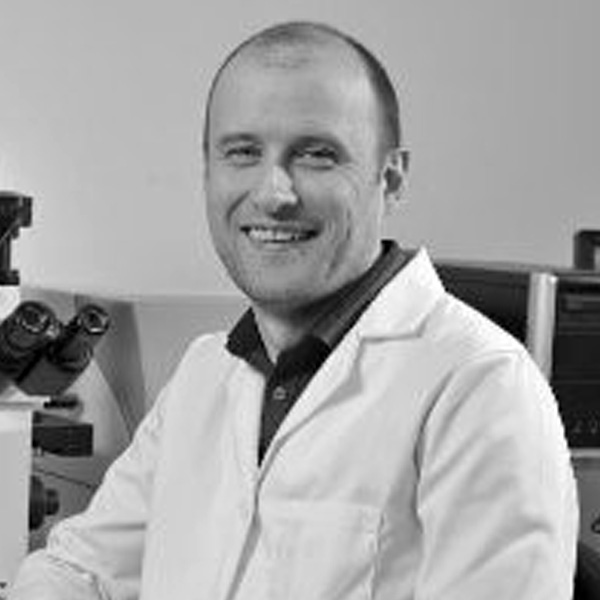
Dr Stephen Maher
Research Area:

Dr Anne-Marie Byrne
Research Area:
Dr Anne-Marie Byrne obtained her undergraduate degree in Analytical Science in Dublin City University in 2000. She completed her PhD in the Royal College of Surgeons in 2006 focused on targeting Angiogenesis using novel peptide inhibitors of VEGF receptors, to sensitise tumour cells to chemotherapy. She started her postdoctoral research in Trinity College Dublin in the Dept of Clinical Medicine investigating mechanisms of Gastrointestinal disease development. She was the Roche Researcher of the year in 2008 and 2009. She was awarded a 3 year Irish Cancer Society Research fellowship in 2013 to investigate novel biomarkers for Oesophageal cancer detection. Dr Byrne currently works in the Dept. of Surgery investigating novel therapeutic strategies targeting the Prostaglandin E2 (PGE2) receptors for prevention of Oesophageal cancer development. She is a course co-ordinator for the Masters in Molecular Medicine with extensive teaching and supervisory experience. Dr Byrne is also the Research Fellows representative for the Faculty of Health Science.
Research Summary
My research is focused on understanding the fundamental mechanisms underlying protein biogenesis, trafficking and secretion, and how these processes are altered during cancer development. I have developed a specific niche area centralised around the structure and function of the Golgi apparatus, which is an organelle responsible for processing proteins in the cell. I identified crucial roles for this organelle in modulation of tumour-associated proteins and signalling processes. Bile acids are components of gastric refluxate (acid reflux) considered to be causative agents for Barrett’s Oesophagus and oesophageal cancer development. I discovered that exposure of oesophageal cells to bile acids causes Golgi structure disassembly and consequently impairs protein glycosylation, cell membrane trafficking and secretion. I have identified that the Golgi structure is fragmented in colorectal and oesophageal adenocarcinoma patient tissue, demonstrating the clinical relevance of this research. Based on this research I have taken a translational approach to identify novel Golgi-associated biomarkers as diagnostic and prognostic indicators for gastrointestinal disease. Since we still do not know much about the basics of how proteins are synthesised or what regulates their secretion, my research is of fundamental importance to understanding these basic cell functions at both physiological and pathological levels.
Projects:
The role of bile acids/acid reflux in promoting Oesophageal Cancer development
How protein trafficking and secretion impact cancer development
The function and dysfunction of the Golgi apparatus in cancer
Targeting EP receptor signalling using novel antagonists for Oesopahgeal cancer prevention
Expertise
Cell Signalling, Oesophageal Cancer, Colorectal cancer, Angiogenesis, Biomarkers, Golgi apparatus, Protein trafficking, Glycosylation, Bile acids,
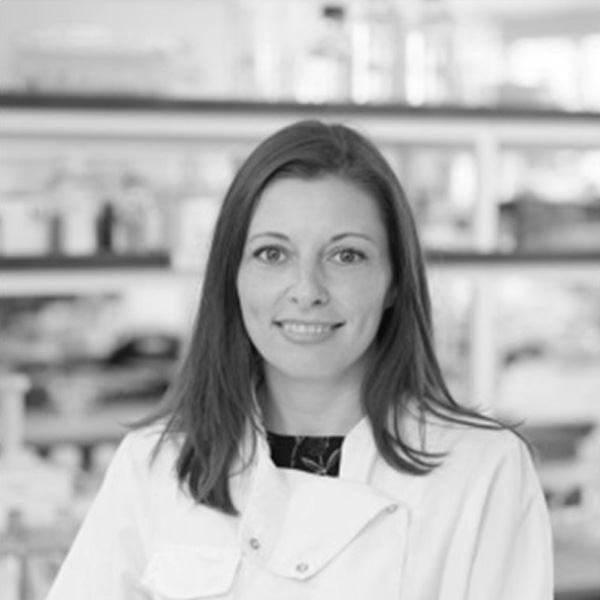
Dr Joanne Lysaght
Research Area:
In 2008, she began working in the Department of Surgery, TCD/St. James’s Hospital. Her research focused on the impact of obesity on anti-tumour immune responses in gastrointestinal cancer patients, with a particular focus on T lymphocytes. In 2009, Dr. Lysaght was awarded a HRB Post-Doctoral fellowship for her work in the area of obesity and tumour immunity. In September 2011, she was appointed Ussher Lecturer in Molecular Oncology and was part of a team who established the award winning M.Sc. in Translational Oncology. She lectures to both undergraduate and postgraduate students in the areas of tumour immunology, inflammation, immunotherapy, tumour microenvironment, oncology and lifestyle factors affecting immunity.
In 2015 Dr. Lysaght was appointed Assistant Professor in the School of Medicine. She has an active research group has authored a number manuscripts in the area of tumour immunity, obesity, immune modulation and lymphocyte trafficking. Other ongoing research projects are examining the impact of obesity on liver inflammation and post-operative recovery, understanding the role of adaptive immunity in the progression of pre-cancerous conditions to cancer, identifying new strategies to harness the immune system to attack or prevent gastrointestinal cancers and understanding the role of the inflammation in wasting conditions such as cancer cachexia.
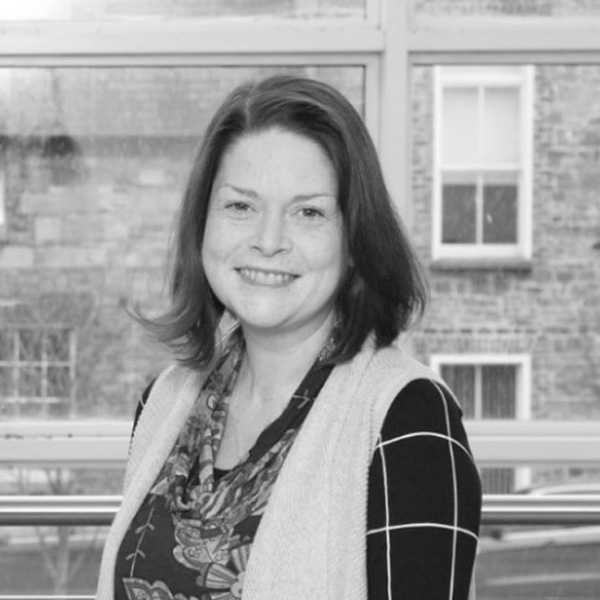
Dr Gemma Cannon
Research Area: Research Fellow
Project links to target:
Gemma is currently a Research Fellow in Dr Stephen Maher’s group, co-funded through the Wellcome Trust Institutional Strategic Support fund and the TCD Faculty of Health Science Deans’ Research Initiative. She is based at the Trinity Translational Medicine Institute, with Department of Surgery, where she works in the area of chemo-radio resistance in oesophageal cancer.
Gemma’s research interests are (i) the identification of molecular mechanisms underpinning resistance to therapy and how these mechanisms are influenced by tumour hypoxia and (ii) can microRNA replacement therapy be used to sensitise tumours to chemo-radiotherapy and (iii) the influence of hypoxia on the efficacy of chemo-radiotherapy sensitising microRNAs.
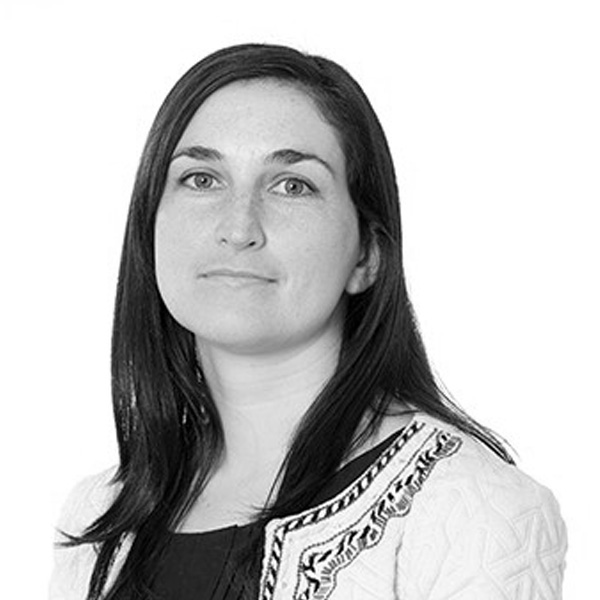
Dr Margaret Dunne
Research Area:
Current post:
Senior Research Fellow at the Department of Surgery, Trinity Translational Medicine InstituteQualifications:
PhD (2010) Maynooth University
Professional Certificate in Postgraduate Teaching and Learning (2008) Maynooth University
BSc Biotechnology (2005) Maynooth University
Research Background:
Dr Dunne’s research interests are focused on elucidating the role of novel innate lymphocyte subsets, such as gamma/delta (γδ) T cells and mucosa-associated invariant T (MAIT) cells, in human health and disease, and how such immunological markers may be used to predict patient clinical outcomes. Studies to date have involved characterisation of T cell subtypes in disorders such as coeliac disease, colorectal cancer and in progression from inflammation to cancer. Dr Dunne’s current work involves assessing whether immunological parameters, such as the antigen presenting molecule HLA-DR can predict patient clinical responses in the setting of oesophageal adenocarcinoma (OAC), an aggressive type of cancer. OAC rates are increasing in Ireland and have been predicted to double within the next two decades.
Project Titles:
1. Development of prognostic screening tools to predict patient response to neoadjuvant chemoradiotherapy treatment for oesophageal adenocarcinoma
2. Assessment of the predictive value of immune and histological parameters in oesophageal adenocarcinoma using digital pathology
Research Areas:
Cancer immunology, immunotherapy, translational medicine, γδ T cells, MAIT cells, immune scoring, patient stratification

Dr Maria Morrissey
Research Area:
Irish Cancer Society Research Fellow at the Department of Surgery, Trinity Translational Medicine Institute
Qualifications:
Ph.D. (2011), University College Dublin
B.A. (Mod.) Genetics (2006), Trinity College Dublin
Research Background:
Dr Morrissey’s research focusses on elucidating the crosstalk between oesophageal tumours and the immune response in patients receiving chemoradiation treatment. This is important for the identification of novel prognostic markers and therapeutic strategies.
Oesophageal adenocarcinoma has one of the worst prognosis of all cancers, and its incidence is increasing faster than that of any other disease in developed countries, including Ireland. Chemoradiation therapy followed by surgery is standard of care for this tumour type, however response and survival rates remain low. Dr Morrissey’s current work involves elucidating the role of inhibition of dendritic cells in gastrointestinal tumours, in particular in oesophageal adenocarcinoma. The connection or crosstalk between tumours and a patient’s immune response is complex and difficult to decipher, but it is of seminal importance for the development of novel markers to predict response and to stratify patients into the most optimal treatment groups. Dendritic cells are professional antigen presenting cells, which initiate the immune response and are fundamental to the body’s defence system to fight cancer. The ability of dendritic cells to stimulate an effective immune response can be highly compromised in cancer patients through unknown mechanisms.
Dr Morrissey’s PhD research was based on the genetics of vertebrate eye development and disease. Dr Morrissey’s career has also encompassed industry-based research, developing novel cancer models in a pharmaceutical R&D company, AstraZeneca, as well as science funding and policy in Science Foundation Ireland.
Research Areas:
Cancer immunology, immunotherapy, translational medicine, dendritic cells, immune profiling, patient stratification, tumour microenvironment, vasculature
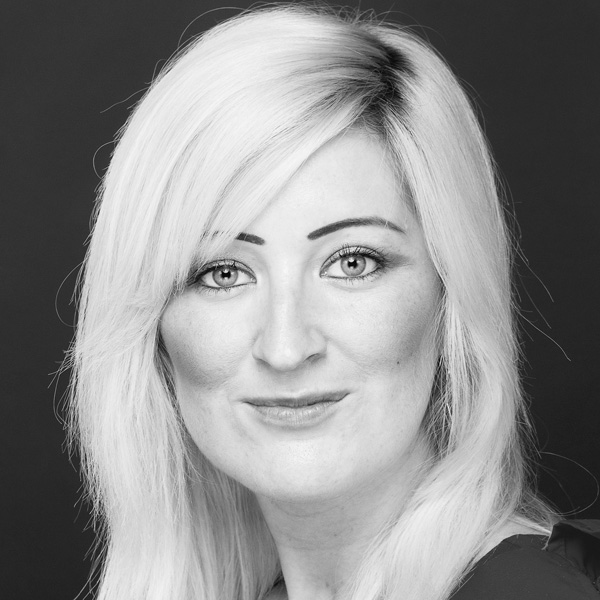
Dr Melissa Conroy
Research Area:
Senior Research Fellow, Tumour Immunology Research Group.
BSc (Hons): NUI Maynooth
PhD: NUI Maynooth
Irish Research Council Government of Ireland Postdoctoral Fellowship: Targeting T cell trafficking as a novel means to control obesity-associated chronic inflammation.
Research Interests: Cancer, liver disease, chemokines, immunotherapeutics, T cells, NK cells, inflammation, obesity.
Obesity is a serious global health problem affecting 500 million adults and over 40 million children worldwide. It is now estimated to be directly responsible for up to 20% of cancer deaths and has the strongest association with oesophageal adenocarcinoma (OAC), of all malignancies. OAC has the fastest growing incidence of all cancers in Ireland and the increasing prevalence of obesity is thought to be one of the main contributing factors for this. Furthermore, obesity is also responsible for increased prevalence of non alcoholic fatty liver disease (NAFLD) which results from altered lipid content and excessive inflammation in the liver. New therapies are urgently required to improve patient survivorship in OAC and to treat and prevent the clinical manifestions of excessive fat in the liver, which are observed in as many as 76% of obese individuals.
The Irish Research Council-funded fellowship is focussed on elucidating the potential of novel chemokine receptor antagonists as an immunotherapeutic target for OAC through which tumour-specific T cell responses can be redirected away from the adipose tissue and liver and toward the tumour. The overall aims of our immunological studies are to improve patient prognosis and survivorship for OAC and alleviate the detrimental complications of obesity in the liver.

Dr Niamh Lynam-Lennon
Research Area: Treatment Resistance in Gastrointestinal Cancer
Dr Niamh Lynam-Lennon graduated from Dublin City University with a B.Sc. in Analytical Science in 2007. She received her PhD in cancer biology from Trinity College Dublin in 2011. Dr Lynam-Lennon is currently a Health Research Board-funded Emerging Investigator in the Dept. of Surgery, Trinity College Dublin, where she works in the area of chemoradiation therapy resistance in gastrointestinal cancer. Her research interests are focused on two main areas; prediction of response to therapy and identification of novel treatment strategies to enhance the tumour response to therapy, with the ultimate goal of improving treatment and survival for patients. Her research spans several topical areas including miRNA and gene expression profiling, altered mitochondrial function and energy metabolism, altered inflammation and cancer stem-like cells in treatment resistance. Dr Lynam-Lennon’s work has resulted in a number of important publications and she has received several prestigious awards such as Roche Researcher of the Year Award 2010, Irish Radiation Research Society Young Investigator Award 2013 and European Association for Cancer Research Young Scientist Award (Junior Award) 2014, for her work.
Outreach Activities: Dr Lynam-Lennon sits on the outreach committee at TTMI, Trinity College Dublin, the mission of which is to promote science and research to patients and the general public. She is involved in organising and running science workshops for school children and delivering talks at schools and public events about cancer research.
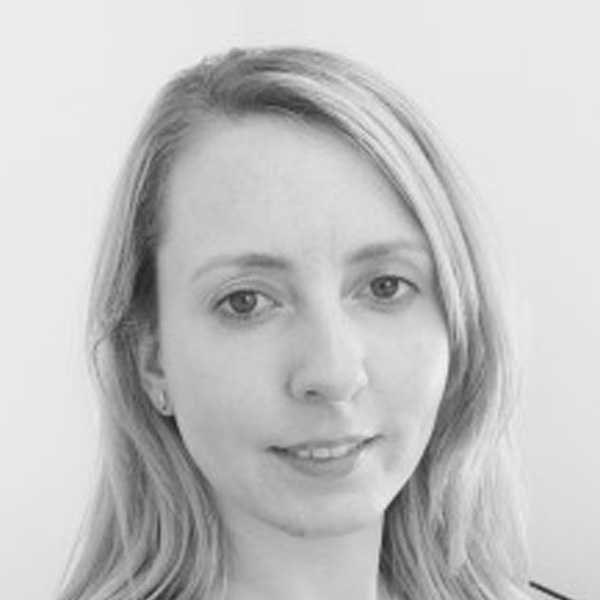
Dr Sarah McGarrigle
Research Area:
Dr Sarah McGarrigle graduated with a BSc (hons.)in Biochemistry from University College Dublin in 2003. She completed her PhD in the Royal College of Surgeons in 2007 which focused on investigating the role of homocysteine and its thiolactone derivative in promoting platelet activation and thrombosis. She joined the Dept. of Surgery, Trinity College Dublin in 2009 as the upper gastrointestinal biobank manager. In 2011 she joined the laboratory of Prof. Elizabeth Connolly to establish and co-ordinate the departmental breast Cancer Research Program. In addition to her role as a researcher, she actively lectures on the MSc in Translational Oncology and BSc in molecular Medicine courses in Trinity College Dublin.
Research Summary:
Our group’s major research interest involves investigating the role of lifestyle factors including obesity and its associated metabolic syndrome in breast cancer initiation and progression. A major focus of our group is investigating the potential to reduce breast cancer risk in women with a germline BRCA 1/2 mutation. To this end we are conducting a prospective study to investigate predictive and modifiable risk factors for the development of breast cancer in a cohort of BRCA mutation carriers. This project will also examine the effect of these lifestyle factors surrogate markers of cancer risk including telomere length and oxidative stress in this patient cohort. In addition we are currently investigating the molecular events involved in driving the development and progression of sporadic breast cancer in the context of obesity and the metabolic syndrome. Of particular interest is the role of mammary adipose tissue in this disease. This project will also examine how obesity and the metabolic syndrome affect this adipose tissue depot. Central to our research, we maintain a breast cancer blood and tissue biobank of high quality samples linked to up to date clinical information. This biobank provides us with the patient material necessary to meet our research objectives.
Projects:
Influence of modifiable lifestyle factors on breast cancer risk in BRCA mutation carriers.
Role of mammary adipose tissue in driving breast tumour progression.
PIK3CA mutations in obesity associated breast cancer (collaboration with Prof. Bryan Hennessy & Dr. Sinead Toomey).
Role of vitamin D in obesity associated breast cancer (collaboration with Prof. JoEllen Welsh University at Albany, New York).
Expertise
Familial breast cancer, BRCA mutations, Lifestyle factors, Biomarkers, telomere length, oxidative stress, adipose tissue, obesity, metabolic syndrome.
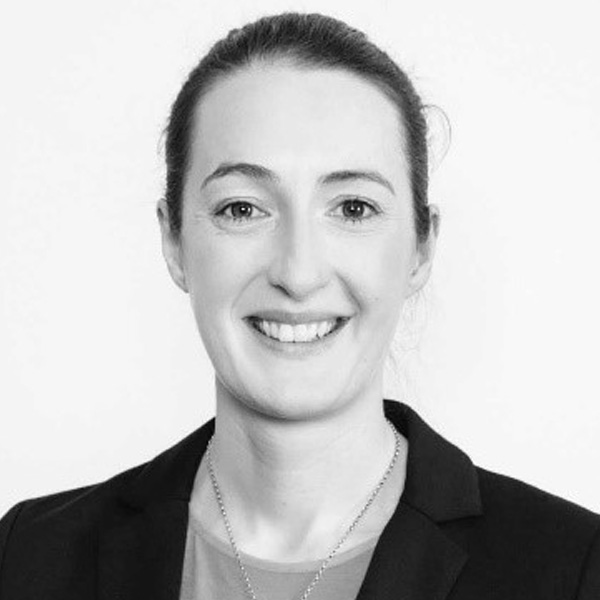
Dr Susan Kennedy
Research Area: Colorectal cancer
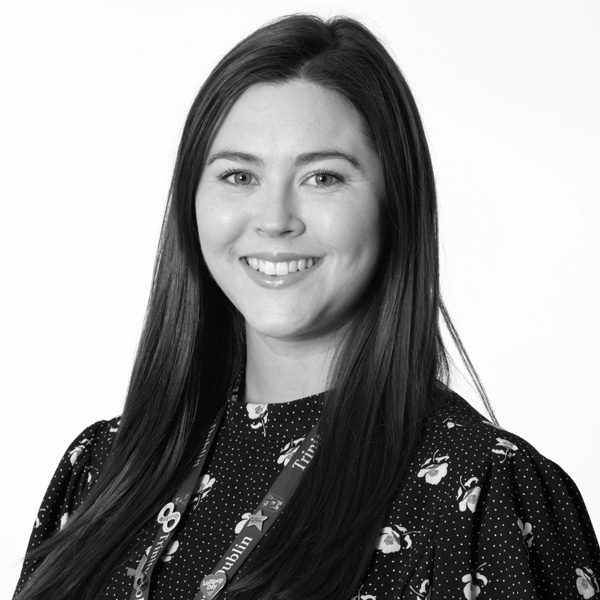
Emma Foley (B.Sc., M.Sc.)
Role: Upper G.I Biobank Manager
Emma graduated from Maynooth University in 2013 with a Double Honors Bachelor degree in Biology and Chemistry. She then went on to complete a Master’s degree in Translational Oncology in Trinity College Dublin (2015). In September 2015, she began working in the Department of Surgery taking on the exciting role of Upper G.I Biobank Manager. Her role as Biobank manager involves working as part of a multidisciplinary team to identify patients that may be suitable to consent and donate their samples to the Biobank. These samples are then processed as per good clinical practice guidelines and stored in the Departmental Biobank.
Biobanks play a crucial role in the development of biomedical and clinical research. The Upper Gastrointestinal (G.I) Biobank in the Dept. of Surgery, St James’s Hospital is a resource that facilitates the collection of blood and tissue samples from patients suffering from upper gastrointestinal disorders with the objective of using these samples to carry out molecular and cellular studies. All patients in St James’s Hospital that are undergoing treatment or investigations for any type of oesophageal/stomach disorder are invited to participate. Their samples are then stored to allow studies to be performed on them in order to identify genes or proteins that could potentially help us answer many unexplained questions relating to these upper G.I conditions, questions such as who is most at risk of experiencing problems with their gastrointestinal tract? What factors are involved in the development of cancers in these areas? Who is likely to benefit from which type of treatments? And also potentially help prevent the development of these conditions in the future.
There is also an adipose tissue biobank where samples of fat taken from patients undergoing resective surgery for oesophageal/ gastric cancers are stored and used to investigate underlying mechanisms responsible for the link between obesity and cancer. This resource is the first available and it enables the interactions between adipose tissue and cancer cell growth to be examined in controlled systems.
Keywords: Biobank, Upper GI, Oesophageal cancer, St James’s Hospital, Research, Dept. of Surgery
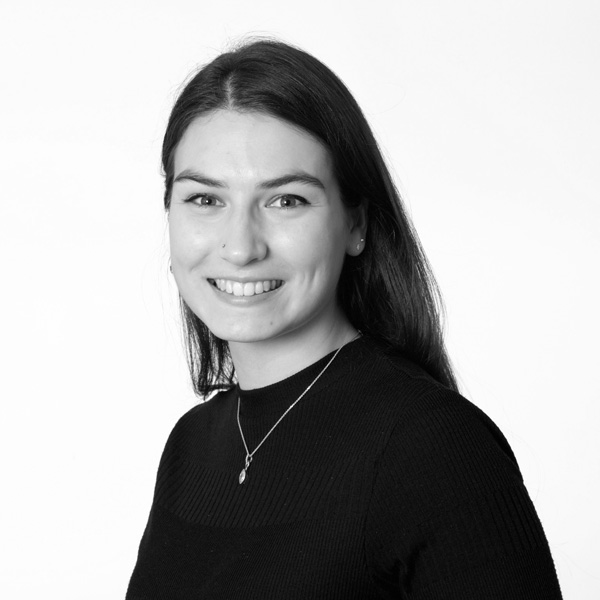
Gillian Barber
Treatment Area: Inflammation & Oesophageal Cancer
PhD Title: Investigating the role of the inflammatory caspases during the progression to Barrett’s oesophagus and Oesophageal Adenocarcinoma.
Gillian’s research project examines oesophageal cancer and how it develops. There are many factors that are thought to lead to developing cancer and one such factor is inflammation that arises in gastric reflux (heart burn) and Barrett’s oesophagus. These conditions can cause a low inflammation that happens over a long time period. Over time, the constant inflammation can cause damage to the oesophagus and lead to abnormal functions within some cells.
Her project aims to understand this inflammation better. With better understanding we can then develop drugs that can reduce inflammation before the cancer develops.
The second part of her project studies obesity in oesophageal cancer patients. The relationship between obesity and inflammation is well known and Gillian is examining this relationship to understand how it can progress to oesophageal cancer.
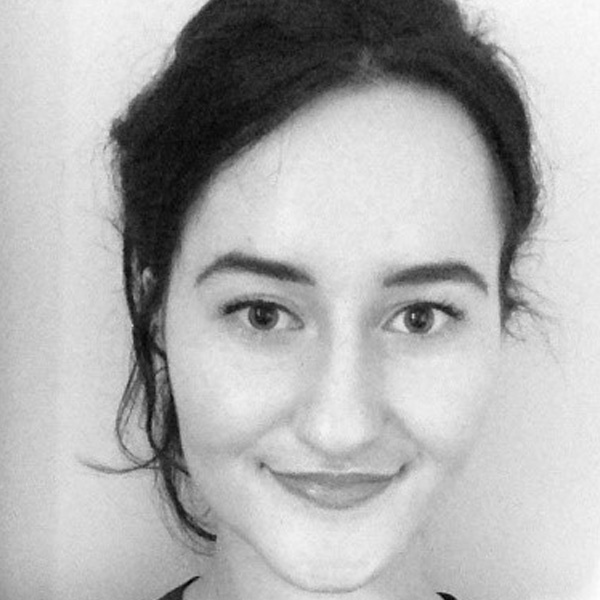
Maria Davern
Research Area: Oesophageal Cancer
PhD Project title: Investigating the applicability of novel cancer immunotherapies in upper gastrointestinal cancers and the impact of concurrent combination chemotherapy.
Maria Davern graduated with a B.Sc. double honours degree in chemistry and biology from Maynooth University in 2016. She then went on to graduate with an M.Sc. in Translational Oncology in 2017 in the Department of Surgery in the Trinity Translational Medical Institute, Trinity College Dublin. Following completion of her M.Sc., Maria was awarded a 2017 Irish Research Council Scholarship to complete a P.hD. under the supervision of Dr. Joanne Lysaght in the Department of Surgery, in the Trinity Translational Medical Institute, Trinity College Dublin, in the area of cancer immunology and immunotherapy. Maria’s research is focused on an aggressive type of cancer that affects the lower part of the food-pipe also known as the oesophagus. This type of cancer is rapidly increasing as a result of rapidly increasing obesity levels and is forecast to increase by 140% by the year 2040. Recently, an immunotherapy known as Keytruda was approved in the treatment of this type of cancer. Immunotherapy is a revolutionary new cancer treatment that stimulates the immune system to seek out and destroy cancer cells. This life-changing therapy lacks the harsh side-effects associated with chemotherapy and radiotherapy and has cured cancer in several patients. Unfortunately, only a fraction of patients benefit from immunotherapy. However, many patients receiving immunotherapy would have first received chemotherapy. Therefore, Maria’s research involves investigating the effect of chemotherapy on the efficacy of immunotherapy.

Niamh Clarke B.Sc. MSc.
Role: Barrett’s Biobank Manager, IBD Research Co-ordinator
Niamh is currently employed by the Department of Surgery; St.James’s Hospital and manages the Barrett’s Oesophagus Biobank. This biorespository stores blood and tissue samples from consented patients, combined with health information for use in translational research. Such patient involvement underpins our translational work in the Department. By carrying out cellular and molecular work on these samples we aim to increase our understanding of the development of Barrett’s oesophagus, and its possible progression to Oesophageal Cancer. This may lead to new drug targets and treatments for our patients.
Niamh is also currently involved in IBD patient focused research involving Ulcerative Colitis and Crohn’s Disease patients. She works closely with a multidisciplinary team and patients alike, in both national and international projects.
Niamh is particularly passionate about science communication and patient and public involvement (PPI) in Research. She especially enjoys the patient interaction and engagement her job involves. She regularly speaks to school students about careers in Science and hopes to increase PPI within the Departments work in the future.
Keywords: Biobanking, Oesophageal Cancer, Barrett’s Oesophagus, Ulcerative Colitis, Crohn’s Disease, Translational Research, Science Communication, Ethics, Patient and Public Involvement, Clinical Trials.
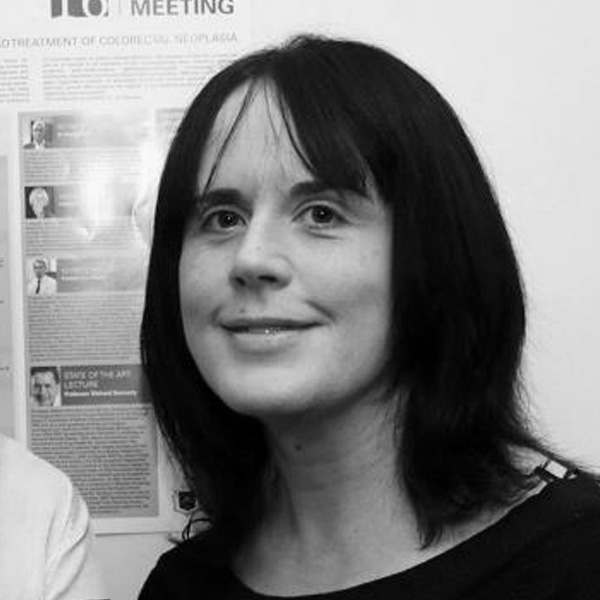
Prof. Jacintha O’Sullivan
Role:
Currently, Prof O’Sullivan directs a translational gastrointestinal (GI) research team in the Trinity Translational Medicine Institute (TTMI) in collaboration with clinical and surgical colleagues. She utilises well established bio-banking structures to drive this GI translational research program. She is internationally recognised in the area of translational gastrointestinal work with many publications in high impact journals and her work has attracted funding from many different sources; Science Foundation Ireland, Health Research Board, Irish Cancer Society, Irish Research Council and from industry collaborators. She has published 3 patents and has graduated a large number of postgraduate Ph.D. and MD students. She is passionate about career mentoring for Ph.D’s and research fellows. Prof. O’Sullivan’s current translational research themes include;
- Development of diagnostic platforms to stratify cancer risk and response to targeted therapies for gastrointestinal diseases.
- Development of novel patented therapeutics to be used in the neoadjuvant and adjuvant treatment setting for gastrointestinal cancer patients (Colorectal and Oesophageal cancers).
- Elucidating how the tumour microenvironment cross talks to the immune system in GI patients.
- Importance of metabolism, inflammation and obesity in driving disease progression and in regulating treatment response.
The outputs of these translational themes will benefit patient care, treatment and management for gastrointestinal diseased patients.
